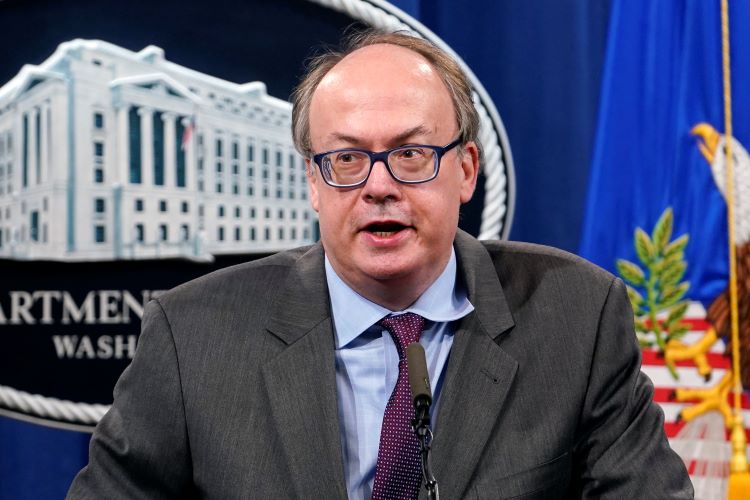Is ex-DOJ official facing ethics trial for 'thought crime'? His election-fraud letter was based on sincerely held belief, lawyer says

Jeffrey Clark, then-assistant attorney general for the U.S. Department of Justice’s Environment and Natural Resources Division, speaks during a news conference in Washington, D.C., on Sept. 14, 2020. (Photo by Susan Walsh/The Associated Press)
A former Department of Justice official accused of drafting a letter with false allegations of election fraud that he hoped to send to Georgia officials did not violate ethics rules, his lawyer said at a disciplinary hearing Tuesday.
Jeffrey Clark, who was the acting chief of the DOJ’s Civil Division, is facing ethics charges for “”what amounts to a thought crime,” Clark’s lawyer, Harry W. MacDougald, said in an opening statement Tuesday.
Law360 reported the remark. The Washington Post, Legal Ethics Roundup, Law.com and Reuters are among the other publications with hearing coverage.
Clark had asked other department officials to sign the letter, but they refused, according to the charges by the District of Columbia Office of Disciplinary Counsel. Clark then told those officials that former President Donald Trump had offered him the job of acting U.S. attorney general, and he was thinking of accepting it if the letter was not sent.
The two officials, then-Acting Attorney General Jeffrey A. Rosen and then-Acting Deputy Attorney General Richard Donoghue, told Trump that he should expect all the assistant attorneys general to resign if Clark became the acting attorney general. Clark did not get the job.
Clark’s draft letter claimed that the DOJ had “identified significant concerns that may have impacted the outcome of the election in multiple states, including the state of Georgia.”
Hamilton P. “Phil” Fox III, the lead prosecuting attorney in the discipline case, said Tuesday during the hearing Clark engaged in “coercive tactics to get this letter sent” and what he was trying to do “was essentially a coup at the Department of Justice,” according to Law360.
MacDougald emphasized that the letter was never sent, the Washington Post reports.
“This was an internal debate and an internal disagreement. The letter was never released by Mr. Clark or by the president,” he said. “Mr. Clark did nothing wrong in having a different opinion from his Justice superiors, especially when it was sincerely held, as the evidence will show.”
Clark is also facing criminal charges in the Georgia election-interference case against Trump.
The ethics charges allege that Clark tried to engage in conduct involving dishonesty by trying to send the letter with false statements, and that Clark tried to engage in conduct that would seriously interfere with the administration of justice.
The hearing, which is streaming live on YouTube, is happening before a committee of the D.C. Bar’s Board on Professional Responsibility, which will make a recommendation to the full board if it finds ethics violations, Reuters explains. After action by the full board, the District of Columbia Court of Appeals has the final say on discipline.
Write a letter to the editor, share a story tip or update, or report an error.



